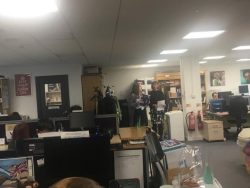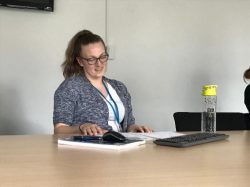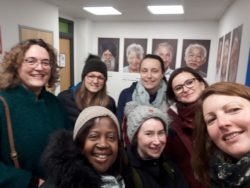Date: 03/05/2019
Lisa Davison is a SCDTP-funded PhD student in the Department of Gerontology at the University of Southampton. Her PhD focuses on loneliness among informal caregivers aged 50+ across England, through secondary quantitative analysis of the English Longitudinal Study of Ageing (ELSA). Other research interests include physical activity among older adults, and age-related health and wellbeing.
Toward the end of summer 2018, I applied for an ESRC funded internship at Age UK in London. The application process involved writing a policy brief in POSTnote format (my topic was End of Life choices: withdrawal of clinically assisted nutrition and hydration), several paragraphs about why I was applying and what I could bring to/get out of the role, an updated CV, then an interview. The main reason I applied for the internship was to gain experience in a relevant field of work, outside of academia, that I might like to pursue post-PhD. I have completed a few research assistant placements during both undergrad and postgrad and wanted to trial something completely new – the third sector!
The 13-week internship at Age UK ran from January – April 2019, where my role was Services Intern; however, more specifically I worked on the Wellbeing team, which is a smaller division within Services. My main task during the internship was to work on the evaluation of a specific project. The project involved training volunteers from local Age UKs to facilitate physical activity sessions for older adults within their community. This project was extremely suited to me, as my undergrad dissertation researched the effects of chair-based exercise on cognitive function and depression in community-dwelling older adults.
Initially I was tasked with reviewing the current monitoring process and was able to offer a few suggestions to improve the quality and quantity of the data they were receiving. In addition to this, I implemented a pre-post questionnaire for participants that was trialled before and after 6-weeks of physical activity sessions.  Throughout the internship, I was also able to visit some local Age UKs to conduct interviews with the staff, volunteers and class participants; these visits were extremely useful to the evaluation process and fantastic to see first-hand the range of activities being delivered through the project. Moreover, I was awarded the opportunity to discuss my work in different contexts. Firstly, I was encouraged to contribute in all regular meetings, these included small and large team meetings (a range of projects) and local programme boards (specifically for my project). Towards the end of the internship, I also presented my work in a 5-minute slot at the monthly floor briefing, and invited staff from the Services and Policy/Research departments to attend a 45-minute presentation where I discussed my role and my findings in more depth.
Throughout the internship, I was also able to visit some local Age UKs to conduct interviews with the staff, volunteers and class participants; these visits were extremely useful to the evaluation process and fantastic to see first-hand the range of activities being delivered through the project. Moreover, I was awarded the opportunity to discuss my work in different contexts. Firstly, I was encouraged to contribute in all regular meetings, these included small and large team meetings (a range of projects) and local programme boards (specifically for my project). Towards the end of the internship, I also presented my work in a 5-minute slot at the monthly floor briefing, and invited staff from the Services and Policy/Research departments to attend a 45-minute presentation where I discussed my role and my findings in more depth.
 In addition to my work on the project, I was keen to gain as much experience as possible during my short time with Age UK. As the wellbeing team works quite closely together, I was able to get involved with other projects. I attended and contributed towards meetings about refreshing the Age UK physical activity webpages, and updated the guidance document for sport and exercise qualifications for another team member. Furthermore, my manager was extremely helpful in organising for me to sit with different departments. I was able to spend a day with Policy/Research and half a day with Age International, where I met with the director, and heads of influencing and policy, programme funding, and communications.
In addition to my work on the project, I was keen to gain as much experience as possible during my short time with Age UK. As the wellbeing team works quite closely together, I was able to get involved with other projects. I attended and contributed towards meetings about refreshing the Age UK physical activity webpages, and updated the guidance document for sport and exercise qualifications for another team member. Furthermore, my manager was extremely helpful in organising for me to sit with different departments. I was able to spend a day with Policy/Research and half a day with Age International, where I met with the director, and heads of influencing and policy, programme funding, and communications.
From the internship, I think I gained the most from simply joining in. Age UK was such a friendly environment to work in; there were frequent team lunches and organised lunch/evening activities. I regularly attended a card games group over lunch with a few colleagues from the Services team, and a yoga session on Monday evenings (open to all Age UK departments). In addition to this, I was commended for my enthusiastic participation in “Healthy January” where I won the step-challenge and the Vegan Bake Off! The opportunity to get to know people from the office through both formal (meetings) and informal (activities) settings has been an incredible confidence boost, I was also able to meet with others who had completed a PhD and learn more about their career experiences. The internship has allowed me to develop my understanding of Age UK and charitable organisations, and has definitely helped me consider a career in the third sector once I finish my PhD. I would definitely recommend applying for one if you were considering it!
the Services team, and a yoga session on Monday evenings (open to all Age UK departments). In addition to this, I was commended for my enthusiastic participation in “Healthy January” where I won the step-challenge and the Vegan Bake Off! The opportunity to get to know people from the office through both formal (meetings) and informal (activities) settings has been an incredible confidence boost, I was also able to meet with others who had completed a PhD and learn more about their career experiences. The internship has allowed me to develop my understanding of Age UK and charitable organisations, and has definitely helped me consider a career in the third sector once I finish my PhD. I would definitely recommend applying for one if you were considering it!